 by Kimberly Blackford
by Kimberly Blackford
The holidays are a busy time of planning, shopping, cooking, decorating and get-togethers. It often becomes easily to forget about the fluffy and feathered members of the family during the rush of the season. Holidays can create unique dangers for your pets that should not be ignored. Each year during the holiday season many pets are seriously injured and/or become ill by their changed surroundings. Foods, treats, plants, and other items found in your home during the holidays may be irresistible to your pet and result in an emergency visit to the vet’s office. To avoid this unwanted stress, a loving pet owner should use extra caution to keep their furry friends healthy and safe during the holidays.
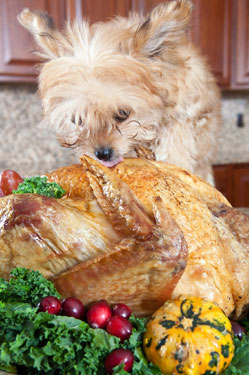
Since pets’ highly sensitive noses pick up scents before humans, do not be surprised to find them in the kitchen while holiday goodies are being prepared. As with children, the homeowner should be aware of those hot containers filled with turkey and ham drippings. Pets can easily tip over unattended pots causing severe scalding and burns to themselves. This same caution should be applied with candles. Cats and dogs will often check out the aromatic scent and risk getting burned. Energetic pets can cause a fire by knocking them over, so never leave a pet unsupervised around lit candles.
Try to keep your pet on their regular diet and avoid feeding them too much table scraps. Rich, fatty foods, such as turkey skins or gravy, can cause pancreatitis and be very painful. Onions can be toxic to both dogs and cats, causing Heinz body anemia, so avoid feeding them stuffing, gravy and other fixings that include onions. Many pets, especially dogs, are attracted to the smell and taste of chocolate. Theobromine is the caffeine-like chemical found in chocolate that is very harmful to dogs, so keep those goodies in a safe place. Nuts can also cause a severe intestinal upset and pose a possible choking hazard. Alcoholic beverages should be kept away from animals year-round. Additionally, poultry bones probably cause the most danger to pets, specifically dogs. These smaller bones break easily and can choke an animal as well as cause blockage in the gastrointestinal tract. Each year, thousands of pets are treated for consumption of splintered bones. By avoiding these types of foods, the pet lover will save themselves a possible trip to the vet office and a carpet cleaning bill.
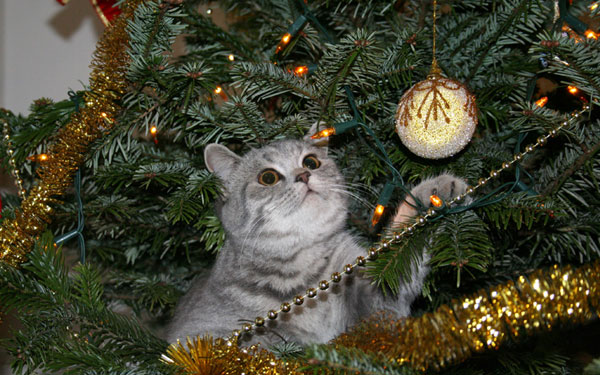
Most pets love to chew and sometimes eat items that are inedible. This will become a definite problem during the holiday season, therefore be sure to avoid toxic decorations. Oils used to scent dried flowers, wreaths and potpourri can be toxic and make pets sick. Potentially harmful inhalents, such as snow sprays and the fluid in bubbling lights, can cause adverse reactions to your pet. Styrofoam and tinsel pose a choking hazard and intestinal obstructions. Cats, in particular, are attracted to tinsel, so be sure to hang it high on the tree or not use it at all. More delicate ornaments should also be hung high on the tree. Place wooden, metal, resin-cast and non-breakable figures on the lower branches in case curious little paws want to play with the bright and colorful treasures. Although those loose pieces of ribbons and bows are irresistible entertainment for pets, it is important to monitor their play. Some ribbons may contain inks that could be toxic to your bird, cat or dog. Additionally, ribbons and bows have the ability to get caught around your pet, so refrain from putting these items around their neck, legs and toes.
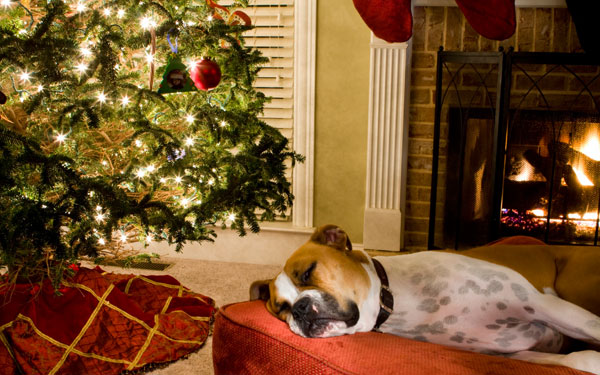
Many other components of a holiday tree can be harmful to pets as well. The tree water is not safe for pets to drink. Stagnant tree water can harbor bacteria and some may contain fertilizers. Chemicals, aspirins and sugars in the water can have hazardous effects if consumed by your animal. When buying tree water preservatives, check the labels and purchase only those that are nontoxic. Additionally, cords and plugs of holiday lights and other fixtures can appear like chew toys to pets. Keep an eye on your pet to make sure they do not bite on the cords. Be sure to safely secure, tape down and cover cords to help avoid shocks, burns and other serious injuries. Tie extension cords out of the way and remember to unplug lights when you are not home. Hardware stores often sell plastic tubing that surround the cords to keep the gnawing pet from hurting itself. Since climbing cats and dogs with wagging tails can easily knock over the tree, fasten it to the wall or ceiling to avoid it being knocked over. Some homeowners use screens around trees to block access to the water, ornaments, electrical cords, gifts and other items that are possible harmful to their pets.
In addition to the tree, many holiday plants can lead to health problems in dogs and cats. A number of seasonal plants are poisonous to pets if nibbled or eaten. Among the plants to keep out of reach are holly, mistletoe, poinsettias, hibiscus, ivy and lilies. Christmas greens, such as balsam, juniper, cedar, pine and fir, all have parts with a low level of toxicity. Pine needles that are ingested can puncture holes in a pet's intestine. It is wise to keep many holiday plants out of reach of pets and children.
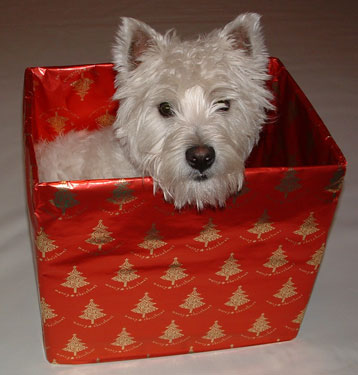
There are some methods that pet owners can use to keep their furry friends away from dangers. A motion-detection device to sense when a pet approaches an off-limit area will activate a burst of compressed air and a one-second warning screech. Since this can be a pricey mechanism, there are a few less expensive methods that can be utilized. Some pet owners place sticky mats, crunchy aluminum foil or bubblewrap around the area to keep pets away. Another inventive idea involves putting some pennies in empty plastic drink bottles and balancing the bottles on the bottom branches of the tree or plant. If the pet gets too close, they will noisily tip over the bottles, alert the pet owner and hopefully retreat from that area.
If your pet happens to ingest glass, broken plastic, staples or other small, sharp objects, call your veterinarian. In the meantime, give your pet supplemental fiber in the form of whole wheat, other high-fiber bread, canned pumpkin or Metamucil. This will bulk up the stools and help the foreign material pass more easily through the digestive system. The amount of dosage given should depend on the size of the animal. For Metamucil, try a teaspoon for a small dog and a tablespoon for a big dog. If giving your pet canned pumpkin, feed one-quarter to two-thirds of a cup. Some pet owners recommend feeding the animal cotton balls to help pass the foreign objects, but many veterinarians caution against this since cotton balls can worsen the problem. Even if the pet passes the object, it is still a good course of action to get the animal checked out by a vet.
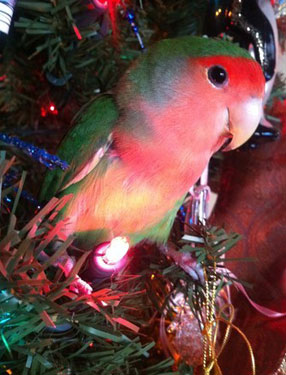
It is also important to monitor pets’ interactions with guests and provide comfort for them during the holiday season. Increased visitors and activity during this time can upset your pet's routine and behaviors. All the extra people in your home may cause stress to pets and possibly allow them to escape out the door. Birds, in particular, get stressed rather easily and the holidays can make it worse by exposing them to sights, sounds, and people that they are not accustomed. Consider leaving your bird caged in a quiet, comfortable, and secure area of your home until the party winds down. It is good planning to allow a quiet, stress-free spot with food and water for any pet during such a busy time of year.
If you are planning to bring a new pet into your home this holiday season, it is usually best to wait until after your household has settled down. This will allow the family to really focus on making your new furry family member feel welcome and secure. Consider putting together and wrapping an “adoption kit,” in place of bringing home an animal right away. Fill a box with items such as pet toys, a bed, a leash, a collar, food, treats and a gift certificate for adoption fees at the local shelter. Then, make an event of visiting the shelter and allowing the whole family to decide on your next best friend.
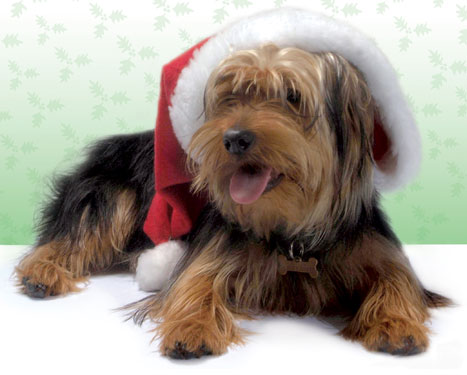
Most pet owners want to give their furry friend an extra special treat for the holidays. Try to stick with healthy, all natural treats made specifically for pets. If you want to decorate your pet, invest in a holiday collar instead of hazardous materials that can possibly choke or harm the pet. Perhaps your dog would like a new cozy bed, or your cat could use a new scratching post. Toasted pumpkin seeds are perfect for pet birds to have a healthy snack that will delight its tastebuds. They also love mirrors or other fun play items for the cage. Take your dog for an extra walk and enjoy some snuggle time. That will help both you and your pet relieve some of that holiday stress.
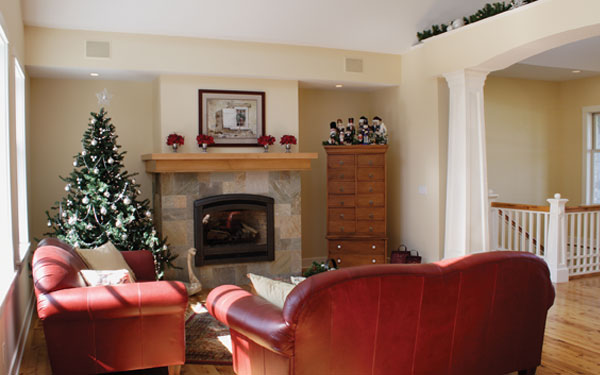
View This Plan
View Other Country House Plans
Keeping your pets safe through the holidays only requires a little bit of precaution and awareness of surroundings. Remember to consider your pets’ age, behaviors and attitudes. It is always the best choice to train your pets. Working and spending time with them with educate the pet owner about the animals’ wants and needs. Correct them when they are wrong, praise them when right, and always show them lots of love. Be safe this holiday season!
Here are some related articles:
- Comfort & Joy: Safe and Happy Holiday
- Personality of Color
- Pet Proofing
- Winterizing Top to Bottom
Save this article to:
back to top